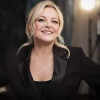Home » Jazz Musicians » Clare Teal
Clare Teal
"It's a small word, jazz," Clare Teal says in a Yorkshire accent that vividly brings to mind Victoria Wood (which is apt, for she shares a similar sense of humor),"a small word that covers a huge range of music."
She's right, and in mid-2007, jazz seems suddenly to be everywhere, enjoying a mainstream revival in all its many hues and variations. Norah Jones, of course, has taken at least the essence of jazz and spread it far and wide, likewise Jamie Cullum, Amy Winehouse and Corinne Bailey Rae. And then there is Clare herself, perhaps the most faithful exponent of them all.
"Me? Oh yes, I very much come from a jazz tradition," she agrees, "but my new album is actually a distinctive move away from it and into something much wider. This is my second major label album, and I wanted it to be clear that I had something distinctive to offer, perhaps even something new."
And, in Paradisi Carousel, Clare has done just that. A rich and often sublime album of succulent tunes and a voice lined with velvet, Paradisi Carousel sees Clare, for strictly soundbite purposes, elevated into a Karen Carpenter for the 21st century, a British Diana Krall. Her loyal army of fans always knew she had the best voice in the country; now everyone will.
"I spent an entire year working on this, which, for me, is very unusual," she says. "In the typical jazz tradition, I normally take no more than six weeks, so it would have been awful if I didn't have something to show for all those additional months, and all that extra effort, don't you think?" Rest assured, her efforts have paid off beautifully. This is a peach of a record.
Let us now, for the sake of biography, state some facts.
Clare Teal hails from a tiny village near Skipton in Yorkshire, and was born 34 years ago to a mother and father with a box full of 78s, and an attic in which to play them. She came to singing early, ridiculously so, and by three could hold a note and make it flutter, although she did so in the privacy of her bedroom. By her teens, she was proving curiously impervious to the many joys of 1980s pop music - unmoved by the pleadings of Nik Kershaw, resistant to the charms of Simon Le Bon - instead turning her attentions to musical styles long since consigned to history.
Read moreTags
"Music To Melt To" As Line-Up For Anglesey's Summer Night Jazz Announced

Source:
Gwen Sion
One of the UK's finest jazz singers and much loved performer, Clare Teal, has been announced as the headline act for Summer Night Jazz, an outdoor event to be held at National Trust's Plas Newydd Country House and Gardens on the Isle of Anglesey, North Wales on Saturday, 2 July 2011. Clare Teal and her band will be joined by rising star Amy Roberts and North Wales-based quintet Dr Jazz for a feast of traditional and contemporary jazz and big ...
read more
Clare Teal plays home town Charity Concert to raise money for The Brandon Trust

Source:
Callum Jones
Bath Resident Clare Teal, one of the country's most popular jazz singers, returns to the stage in her adopted home town on Friday 19th November wth a stunning new show in aid of The Brandon Trust. The concert, which is to raise money to help people with learning difficulties and complex needs, will be held at Komedia Bath 22-23 Westgate Street Bath BA1 1EP After many years of performing sell out shows based on the traditional American songs of the ...
read more
BBC Big Band & Clare Teal - Grassington Festival

Source:
All About Jazz
Yorkshire's finest export after Betty's tea room was the star attraction at Grassington's annual music festival. Clare Teal who was voted BBC Jazz Vocalist of the year 2006 and British Jazz Vocalist of the year 2005 & 2007 presented a whole program featuring music from her new album “Get Happy". The album is a gem for all jazz fans featuring may well known classics such as Cheek To Cheek, Begin The Beguine and Time After Time. For those of you ...
read more
Clare Teal & Peter Grant to sing together at York Opera House

Source:
All About Jazz
Yorkshire's Top Jazz Singers Join Forces Two of Yorkshire's most successful jazz singers are to make a special concert appearance together on Sunday 18th June. Award winning artist Clare Teal has invited newcomer Peter Grant, whose debut album “New Vintage" shot straight into the National charts at No.8, to join her for her performance at The Grand Opera House in York on Sunday 18th June. The two artists met while recording a special “Friday Night Is Music Night" for BBC ...
read more
Clare Teal duets with 60s Pop Legend Live in Scotland

Source:
All About Jazz
Clare Teal performed Live on Stage with pop legend Tony Christie as part of BBC Radio 2’s Live from Aberdeen week. Clare performed songs from her latest chart hit album “Don’t Talk” as well as “I’m Beginning To Se The Light” from her 2003 album “The Road Less Travelled” . She also joined Tony in a unique duet of the oscar winning “A Whole New World” taken from the film Aladdin. The complete show “Friday Night Is Music Night” can ...
read more
Clare Teal & Ian Shaw get it together....

Source:
All About Jazz
UK singer Clare Teal stunned a packed audience at Scarborough jazz festival by making a surprise appearance on stage during a concert by Ian Shaw. The singer, signed to Sony records, had headlined the festival the day before where she had played to a sold out auditorium and was presumed by all the festival goers to be on her way to Durham for a concert at The Gala Theatre, but Clare stayed behind specially to sing with her friend who ...
read more
Jazz Star Clare Teal Presents New BBC Radio Series

Source:
All About Jazz
Clare Teal returns with a new series for Friday evenings, looking at the people, places and organisations behind the scenes of making a record. In this series Clare focuses on producer George Martin, ghost vocalist Marni Nixon, composer John Barry, the record label Capitol Records, accompanist and arranger George Shearing and the studio Abbey Road. “Although I haven't worked with these people or companies, in one way or another they've all influenced me," says Clare. “They have such interesting stories ...
read more
Clare Teal wins British Jazz Award for "Best Vocalist 2005"

Source:
All About Jazz
Clare Teal wins “Jazz Oscar" Jazz Star Clare Teal attended the re-launch of The British Jazz Awards in Birmingham last night. After an absence of 9 years, the British Jazz Awards returned to Birmingham last night. The city hosted the event from its inception in 1987 until 1995 when the then sponsors moved the event, known as “The Jazz Oscars”, to London. The event enjoyed a high profile, finding a home of The BAFTA Building in the Strand but, the ...
read more
Clare Teal & Jamie Cullum join forces for Charity

Source:
All About Jazz
Yorkshire's finest jazz singer performs with Jamie Cullum for charity. Yorkshire born singer Clare Teal has announced that she is to perform a special concert with jazz superstar Jamie Cullum in her adopted home of Bath. The concert is to raise money to buy a CT scanner for the local RUH Hospital and will be held at The Bath Rugby Ground on July 31st. Clare visited the hospital and talked to staff and patients who are hoping the concert will ...
read more
Clare Teal presents the 40th Anniversary of Stan Tracey's "Under Milk Wood"

Source:
All About Jazz
Last Friday, April 22nd, Clare Teal hosted a special 40th anniversary celebration of Stan Tracey's “Under Milk Wood" suite for BBC Radio 2. The show was recorded live at The Mermaid Theatre in London and will be broadcast on BBC Radio 2 on Monday 2nd May 2005 (8pm-9pm). The show features Stan Tracey on piano, Clark Tracey on drums, Andrew Cleyndert on bass and Bobby Wellins on saxophone who played with Stan on the original 1965 record as well as ...
read more



























